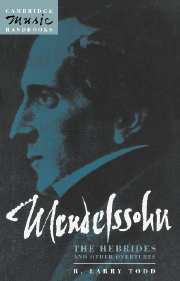5 - The overtures as programmatic music
Published online by Cambridge University Press: 23 November 2009
Summary
‘All pure music’, Friedrich Schlegel observed in an aphorism of Das Athenäum, ‘must be philosophical and instrumental.’ Pure music engages a realm of ideas that cannot be translated into the language of mere words; indeed, ‘must not purely instrumental music create its own text?’ In Schlegel's sketch-like comments from the turn to the nineteenth century may be found the kernel of Mendelssohn's musical aesthetic, that pure music represented a form of language superior to that of words, and that instrumental music offered the composer a powerfully expressive language to explore. At stake was the issue of what Robert Schumann in the 1830s would term the ‘dependability of musical expression’. Exactly what were the limits of, and how precise was musical expression? During the 1820s these issues were thoroughly pondered in the pages of the Berlin Allgemeine musikalische Zeitung by Adolf Bernhard Marx, the theorist who, according to Eduard Devrient, held greater sway over Mendelssohn than any of his other friends.
Judith Silber Ballan and Scott Burnham have recently examined how Marx aimed at nothing less than a bold theory of ‘characteristic music’, by which he meant that all music expressed certain fundamental ideas, or Grundideen. In the case of Beethoven's symphonies, music had come to express a series of powerful psychological states, which, though they could not be rendered into explicit words, could be grasped somehow at a basic level by listeners. Few who heard the ‘Eroica’ Symphony without knowledge of the title, for example, could fail to comprehend that the symphony expressed the heroic. Sometimes, Marx averred, an instrumental composition could successfully convey a type of musical narrative without the use of a text. One such example was Beethoven's Wellington's Victory, with its opposition of English and French melodies.
- Type
- Chapter
- Information
- Mendelssohn: The Hebrides and Other Overtures , pp. 69 - 83Publisher: Cambridge University PressPrint publication year: 1993
- 1
- Cited by



